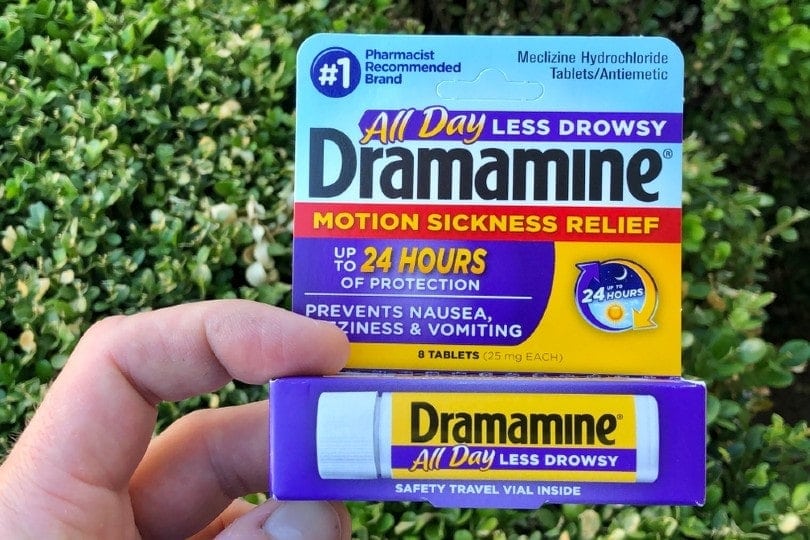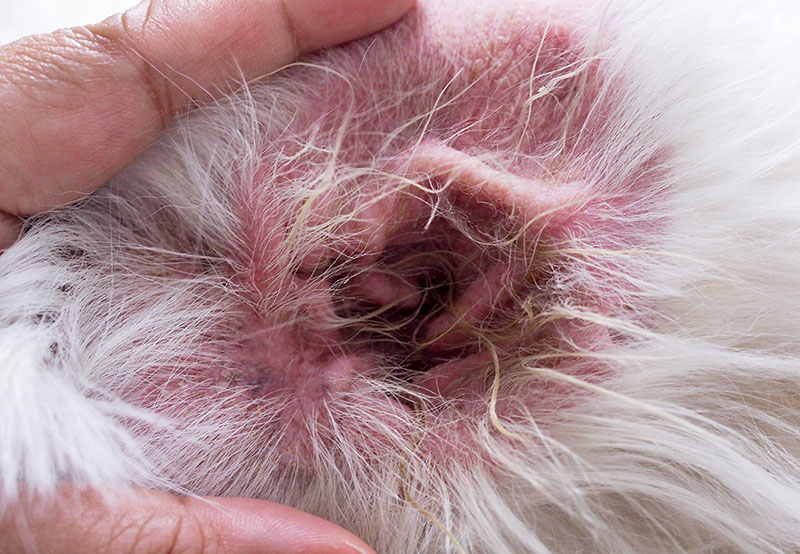Dramamine for Dogs: Uses, Dosage, Side Effects (Vet Answers)

Updated on

Click to Skip Ahead
Have you ever peeked into your medicine cabinet at home and wondered if you could use some of those drugs to treat your pet? Some of the medications that humans take can be very toxic to pets, but there are also some that can be useful. Dramamine is one of these human medications that veterinarians occasionally use to treat dogs. However, like any medication, there are some risks involved in giving your dog Dramamine. In order to be effective, and to reduce the risk of side effects, it must be given at the right dose.
What Is Dramamine?
The active ingredient of Dramamine is dimenhydrinate, which is part of the class of drugs known as antihistamines. They are more commonly used to treat allergies, but Dramamine also helps to treat nausea (sickness). Scientists do not know exactly how it does this, but it does seem to be an effective treatment for motion sickness in humans.
Although Dramamine is a human medication, it is sometimes used “off-label” in pets, as there is no similar product available that is designed specifically for pets. This means it has not gone through the rigorous FDA approval process that other “labeled” dog drugs have. As a result, we do not understand as much about how well it works and what the side effects are when compared to a labeled drug.
However, veterinarians can prescribe “off-label” drugs in certain situations, usually when there is no labeled drug available or the labeled drug is unsuitable for some reason. Your vet can talk you through the risks and benefits of using an off-label drug.
Dimenhydrinate is also sold under other brand names, including Draminate, Gravol, and Triptone.
Dramamine for Dogs: Uses
Dramamine is used to treat several different conditions in dogs.
Dramamine for Motion Sickness in Dogs
Dramamine can be used to treat dogs who feel queasy or vomit when traveling. Medication can be useful if your dog regularly vomits in cars or if you need to be on a longer journey. However, other labeled medications are available to treat motion sickness, so Dramamine may not be the first medication that your veterinarian recommends.
It is best to administer Dramamine 30 to 60 minutes before you are due to start your journey.
There are other reasons why dogs may vomit during a car journey. It can also happen due to stress or anxiety, so Dramamine and other anti-sickness medications are not always effective.
Dramamine for Dogs With Vestibular Disease
Vestibular disease is a syndrome usually seen in older dogs where there is a problem in the inner ear or brain (the vestibular system). In some cases, tests can find a reason for these, such as a middle ear infection or a brain tumor. In other cases, it is idiopathic, meaning there is no known cause.
Signs of Vestibular Disease
The signs of vestibular disease are similar regardless of the underlying cause.
The vestibular system deals with balance and coordination, so when it is not working properly, dogs can appear very unsteady, almost as though they are drunk. They may stumble or fall to the side. Often, they will fall repeatedly in the same direction, either to their left or their right. If they are unable to walk, then you may see them appear to try and roll themselves repeatedly in one direction.
- Nystagmus (rapid flicking of the eye from side to side)
- A head tilt (permanently holding the head to one side)
- Circling (walking around in circles, usually only in one direction)
- Nausea (which can be seen as lip-licking) and vomiting.
The nausea and vomiting happen because these dogs are experiencing an extreme form of motion sickness. They feel like the world is spinning around them and have no idea which way is up, and their eyes have difficulty focusing to help them get their bearings.
Dramamine is one of the medications that can be used to treat this nausea, but there are other labeled medications, too. Your veterinarian can advise on whether Dramamine is a good choice for your dog.
Side Effects of Dramamine in Dogs
Dramamine has many other effects on the body besides treating nausea, so we can see a variety of potential side effects.
- Lethargy (quietness, sleepiness)
- Dry mouth
- Inability to fully empty the bladder (which can lead to bladder infections)
- Vomiting
- Diarrhea
- Lack of appetite
If your dog is lethargic when they first start taking Dramamine, this may improve over time. Occasionally, instead of becoming lethargic, dogs may become over-excited after taking Dramamine.
Not all dogs who take Dramamine will get these side effects, but if your dog is taking it and they develop any of these signs then you should speak to your veterinarian.
Dramamine for Dogs: Drug Interactions
Dramamine has many different effects on the body. If your dog is taking any other medications, these can interact and cause more severe side effects.
- Antidepressants such as clomipramine (Clomicalm®) or amitriptyline, which may be used to treat behavioral issues.
- Monoamine Oxidase Inhibitors such as selegiline (Anipryl®), which is used to treat cognitive dysfunction in older dogs, or may be prescribed for anxiety.
If your dog is taking any of these medications, speak to your veterinarian about this before giving your dog Dramamine.
You May Also Like: Ask a Vet: Depression in Dogs – Signs, Causes, Treatments, & More
Dramamine in Dogs: Dosage
The dose of Dramamine that your dog will need depends on multiple things, including:
- Their exact body weight
- The health condition that it is being used to treat
- Any other illnesses that they may have.
Dramamine is also not suitable for every dog, as certain conditions may put them at a high risk of side effects. At-risk dogs include those with:
- Glaucoma
- Some bladder or bowel conditions
- High blood pressure
- Heart disease
- Some lung diseases such as asthma
- A history of seizures.
To find out whether Dramamine is right for your dog, and to determine what dosage of Dramamine you should use speak to your veterinarian for advice.
Conclusion
While it might seem like a good idea to give our dogs the same medications that we use, you have to know that dogs don’t react the same way to certain drugs as humans. While Dramamine is sometimes used for dogs, you should always consult your vet before giving them any.
Featured Image Credit: ZikG, Shutterstock














